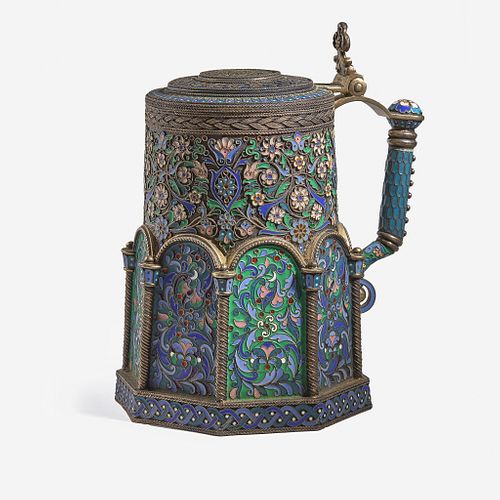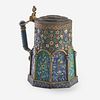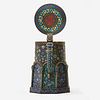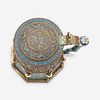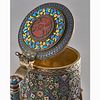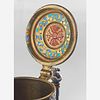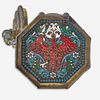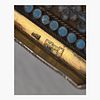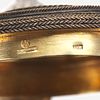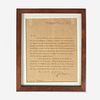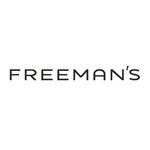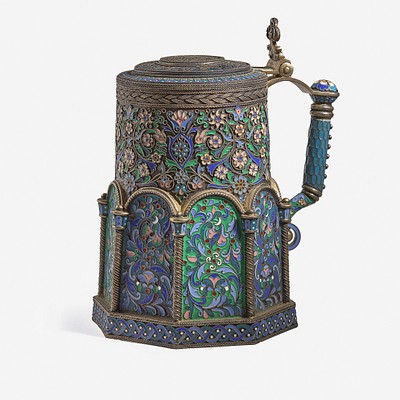A Russian Silver-Gilt Plique-?-Jour and Cloisonn? Imperial Presentation Tankard Pavel Ovchinnikov, Moscow, 1892
About Seller
2400 Market St
Philadelphia, PA 19147
United States
Established in 1805, Freeman’s Auction House holds tradition close, with a progressive mind-set towards marketing and promotion, along with access to a team of top experts in the auction business. And now with offices in New England, the Southeast, and on the West Coast, it has never been easier to ...Read more
Two ways to bid:
- Leave a max absentee bid and the platform will bid on your behalf up to your maximum bid during the live auction.
- Bid live during the auction and your bids will be submitted real-time to the auctioneer.
Bid Increments
| Price | Bid Increment |
|---|---|
| $0 | $25 |
| $500 | $50 |
| $1,000 | $100 |
| $2,000 | $200 |
| $3,000 | $250 |
| $5,000 | $500 |
| $10,000 | $1,000 |
| $20,000 | $2,000 |
| $30,000 | $2,500 |
| $50,000 | $5,000 |
| $100,000 | $10,000 |
About Auction
Feb 24, 2022
Freeman’s February 24 auction, The Gilded Age, highlights the eclectic tastes of artists and collectors in the late 19th century, led by an impressive Russian silver-gilt imperial presentation tankard. Curated by Laura Sevelis, Junior Specialist British & European Furniture & Decorative Arts. Freeman's info@freemansauction.com
- Lot Description
A Russian Silver-Gilt Plique-?-Jour and Cloisonn? Imperial Presentation Tankard Pavel Ovchinnikov, Moscow, 1892
The lid marked for Pavel Ovchinnikov with standard mark of 84 and St. George for Moscow 1861-96, the base marked with 'NO' for Pavel Ovchinnikov and assay mark for Anatoly Apollonovich Artsybashev, 1892, sold together with a letter dated May 27, 1893, from Prince Cantacuz?ne on behalf of Tsar Alexander III on letterhead from the Russian Imperial Legation, Washington DC, dated May 27, 1893, to A.W. Biddle.
(H: 7, W: 6 in.)Provenance
Presented by Prince Cantacuzene on behalf of Tsar Alexander III to A.W. Biddle, May 27, 1893.
Thence by descent.
Footnote:Note
This exceptional tankard was presented to Dr. Alexander W. Biddle (1856?1916) in gratitude for services provided to Russia during the famine of 1891-92. Poor harvests throughout the 1880s had taken a deep toll on the agrarian peasantry of Imperial Russia, and nationwide relief efforts began across America, including representatives of Philadelphia?s business and social elite. Philadelphia was the first city to fund, organize, and dispatch a ship (the Indiana) filled with flour and other provisions, doing so in less than a month. The Indiana left Philadelphia on February 22, 1892, and arrived in Libau (the Russian Imperial name for Liep?ja, Latvia) on March 16. Accompanying the shipment were ?the members of the Philadelphia committee, Messrs. Blankenburg, Drexel, and Biddle.?
The American aid efforts left a mark not just on the Russian populace and state apparatus, but the Imperial Family as well. Tsar Alexander III told the American minister to Russia: ?I am very much touched by the interest and kindness which the people of the United States are showing in sending ships of flour to my suffering people.? The generosity of the Philadelphians would not be forgotten. A year later, on May 27, 1893, the front page of the Philadelphia Inquirer read ?The Czar Rewards Friends In Need: Russia?s Grateful Ruler Sends Costly Silver Gifts to Nine Leading Philadelphians.?
To mark Alexander III?s decade on the throne, a great Coronation Day program of events was planned for Philadelphia; the flagship Dimitri Donskoi and a second Russian ship, the Rynda, anchored in the Delaware River overlooking the city. The Russian Minister to the United States, Prince Cantacuz?ne, provided the media with the text of his letter to the gift recipients. This letter of appreciation was reprinted in full on the front page of the May 27th edition of the Inquirer; it is identical to the original letter from Prince Cantacuz?ne to Dr. Biddle, which accompanies the tankard in this sale. Both Biddle and Drexel attended the events aboard the Dimitri Donskoi, and were recipients of gifts from the Tsar.
?Each present possesses a distinct individuality and is conceded to be a chef-d??uvre of the silversmith?s art,? the Inquirer observed, as well as noting that all were made in St. Petersburg ? two by Grachev and eight by Ovchinnikov. Dr. Biddle?s tankard is not individually described, but it is noted as ?a silver gilt enameled cup, similar to that prepared for Mr. C.M. Reeve? (Charles M. Reeve was a Minneapolis businessman who had been involved in the Midwestern group of relief efforts.) Mr. Reeve?s similar gift is described as such: ?a tankard, gilt and enamel. The enameling of this tankard, or covered cup, is exquisite. The bottom, perforated, had a bold design of leaves and vine tendrils wrought into the perforations in translucent enamel, with an extremely rich affect.? With the exception of the unique design used on the tankard underside and lid, this description matches Dr. Biddle?s tankard precisely.
For similar examples see: Hillwood Museum, Washington, DC, item no. 15.44, and Bonham's, December 1, 2021, lot 128.
Related Literature
Philadelphia Evening Bulletin, February 1, 1892.
George S. Queen, ?American Relief in the Russian Famine of 1891-1892,? The Russian Review vol. 14, no. 2 (April 1955).
Foreign Relations of the United States 1892, Document 319.
Foreign Relations of the United States 1892, Document 321.
American Sympathy with Russian Distress,? The Russian Famine Relief Committee of Philadelphia (1892).
The Inquirer Washington Bureau, ?Czar Rewards Friends in Need,? The Philadelphia Inquirer (Philadelphia), May 27, 1893.
The Philadelphia Inquirer (Philadelphia), May 28, 1893.
- Shipping Info
-
No lot may be removed from Freeman’s premises until the buyer has paid in full the purchase price therefor including Buyer’s Premium or has satisfied such terms that Freeman’s, in its sole discretion, shall require. Subject to the foregoing, all Property shall be paid for and removed by the buyer at his/ her expense within ten (10) days of sale and, if not so removed, may be sold by Freeman’s, or sent by Freeman’s to a third-party storage facility, at the sole risk and charge of the buyer(s), and Freeman’s may prohibit the buyer from participating, directly or indirectly, as a bidder or buyer in any future sale or sales. In addition to other remedies available to Freeman’s by law, Freeman’s reserves the right to impose a late charge of 1.5% per month of the total purchase price on any balance remaining ten (10) days after the day of sale. If Property is not removed by the buyer within ten (10) days, a handling charge of 2% of the total purchase price per month from the tenth day after the sale until removal by the buyer shall be payable to Freeman’s by the buyer. Freeman’s will not be responsible for any loss, damage, theft, or otherwise responsible for any goods left in Freeman’s possession after ten (10) days. If the foregoing conditions or any applicable provisions of law are not complied with, in addition to other remedies available to Freeman’s and the Consignor (including without limitation the right to hold the buyer(s) liable for the bid price) Freeman’s, at its option, may either cancel the sale, retaining as liquidated damages all payments made by the buyer(s), or resell the property. In such event, the buyer(s) shall remain liable for any deficiency in the original purchase price and will also be responsible for all costs, including warehousing, the expense of the ultimate sale, and Freeman’s commission at its regular rates together with all related and incidental charges, including legal fees. Payment is a precondition to removal. Payment shall be by cash, certified check or similar bank draft, or any other method approved by Freeman’s. Checks will not be deemed to constitute payment until cleared. Any exceptions must be made upon Freeman’s written approval of credit prior to sale. In addition, a defaulting buyer will be deemed to have granted and assigned to Freeman’s, a continuing security interest of first priority in any property or money of, or owing to such buyer in Freeman’ possession, and Freeman’s may retain and apply such property or money as collateral security for the obligations due to Freeman’s. Freeman’s shall have all of the rights accorded a secured party under the Pennsylvania Uniform Commercial Code.
-
- Buyer's Premium



 EUR
EUR CAD
CAD AUD
AUD GBP
GBP MXN
MXN HKD
HKD CNY
CNY MYR
MYR SEK
SEK SGD
SGD CHF
CHF THB
THB